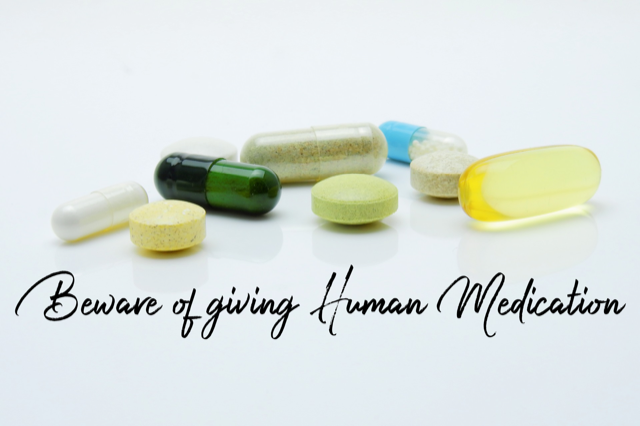We all have a medication cabinet/drawer/basket at home, usually in our bathrooms. Somewhere, where small children and pets can’t reach or get into, right? However, what if something is left out? Or the cap on the bottle wasn’t tight enough? Or what if Fluffy and Max get ahold of the bottle and eat through it? Human medications can be extremely toxic to our beloved animals, and should never be given to our pets.
Here are just a few common medications that might be living in your medication cabinet:
Non steroidal anti-inflammatory drugs (NSAIDs) that can cause toxicosis in cats and dogs include aspirin, ibuprofen, and naproxen. This category of drug can cause “…gastric ulceration and acute kidney failure in dogs and cats.” (6) There are specific NSAIDs available for animals through your veterinarian with a prescription. What might be good for human aches and pains is toxic to our furry friends.
Aspirin:
Signs that your pet might have gotten into aspirin are most commonly gastrointestinal signs, changes to their breathing, kidney failure, and even seizures. (2) Even baby aspirin can be lethal to your cat or dog.
Ibuprofen:
In small amounts, ibuprofen can cause ulcers resulting in sometimes bloody vomit, diarrhea, and pale gums. In large amounts of ibuprofen, it can cause kidney and liver failure all the way up to neurological problems. (5)
Naproxen:
Otherwise known as Aleve and Midol, is very toxic to our pets. Even in small amounts, naproxen can cause similar signs of toxicity as the other drugs in the NSAID category. Severe ulceration of the gastrointestinal tract can lead to tears in the tract, which in the long run, could lead to the pet becoming septic and could cause death. (4)
A COMMON PAIN RELIEVER AND FEVER REDUCER THE MAJORITY OF US HAVE ON HAND IS ACETAMINOPHEN.
Acetaminophen, commonly referred to as Tylenol, can be very toxic to cats. Our feline friends “…have a decreased ability to metabolize acetaminophen in their liver…” (1) which can be very detrimental to their health. Animals who may have ingested Tylenol can exhibit signs such as vomiting, diarrhea, decreased appetite, difficulty breathing, and jaundice.
These are just a few examples of toxic household medications that can cause serious problems for animals. Human medications should never be given to our pets. Always consult with your veterinarian before giving over-the-counter medications.
If you think your pet has gotten into something toxic, give your veterinarian a call; they might need immediate medical attention. Knowing what kind of medication, how much, and approximately when it may have been ingested will aid your veterinary team in how to treat your pet.
Medications aren’t the only dangers that lurk in our homes; foods, plants, cleaning products, and other things can all pose a threat to your pets health. (3) Knowing some of these items can potentially save your pet’s life. Our veterinarians and technicians are here to help care for and treat your pets should they get into something they weren’t meant to.
Sources:
1. “Acetaminophen.” Pet Poison Helpline, Acetaminophen: https://www.petpoisonhelpline.com/poison/acetaminophen/.
2. “Aspirin.” Pet Poison Helpline, www.petpoisonhelpline.com/poison/aspirin/.
3. “Household Hazards.” AVMA, www.avma.org/public/PetCare/Pages/householdhazards.aspx.

